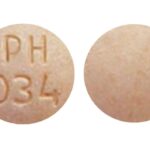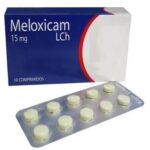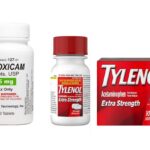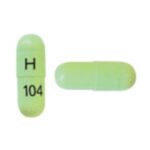Meloxicam (Mobic): Uses, Dosage, Side Effects, Interactions
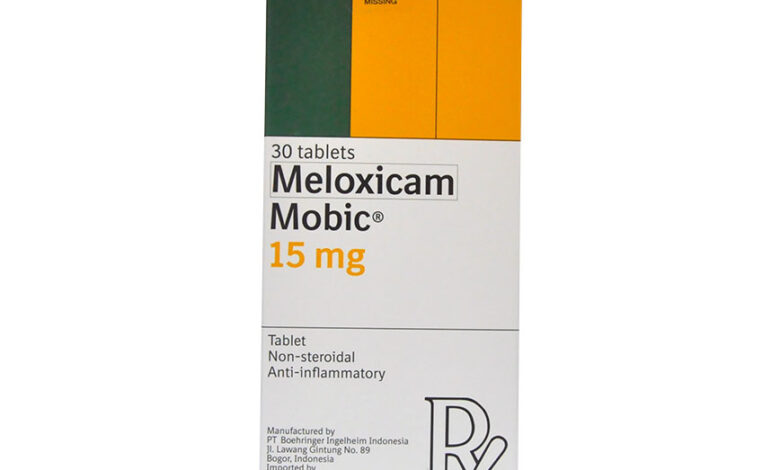
Meloxicam, sold under the brand name Mobic among others, is a nonsteroidal anti-inflammatory drug used to treat pain and inflammation in rheumatic diseases and osteoarthritis. It is recommended that it be used for as short a period as possible and at a low dose.
Meloxicam works by blocking the effect of natural chemicals called cyclo-oxygenase (COX) enzymes. These enzymes help to make other chemicals in the body, called prostaglandins. Some prostaglandins are produced at sites of injury or damage and cause pain and inflammation.
How long does it take for meloxicam (Mobic) to start working?
Meloxicam can take up to two weeks to start working in full effect. Some changes to pain, swelling, tenderness, or stiffness may be noticeable within 24 to 72 hours, but it might take longer to notice a large difference in pain levels.
How should meloxicam (Mobic) be used?
Meloxicam comes as a tablet and suspension (liquid) to take by mouth. It is usually taken once a day with or without food. Take meloxicam at the same time every day. Follow the directions on your prescription label carefully, and ask your doctor or pharmacist to explain any part you do not understand. Take meloxicam exactly as directed. Do not take more or less of it or take it more often than prescribed by your doctor.
Shake the suspension well before each use to mix the medication evenly.
What happens if I miss a dose?
Take the missed dose as soon as you remember. Skip the missed dose if it is almost time for your next scheduled dose. Do not take extra medicine to make up for the missed dose.
What happens if I overdose?
Seek emergency medical attention or call the Poison Help line at 1-800-222-1222. Symptoms of overdose may include the following:
- lack of energy
- drowsiness
- nausea
- vomiting
- stomach pain
- bloody, black, or tarry stools
- vomit that is bloody or looks like coffee grounds
- difficulty breathing
- seizures
- coma
What to avoid
Avoid alcohol. Heavy drinking can increase your risk of stomach bleeding.
Avoid taking aspirin while you are taking meloxicam unless your doctor tells you to.
Ask a doctor or pharmacist before using other medicines for pain, fever, swelling, or cold/flu symptoms. They may contain ingredients similar to meloxicam (such as aspirin, ibuprofen, ketoprofen, or naproxen).
Meloxicam (Mobic) Safety Information
People who take nonsteroidal anti-inflammatory drugs (NSAIDs) (other than aspirin) such as meloxicam may have a higher risk of having a heart attack, or a stroke than people who do not take these medications. These events may happen without warning and may cause death. This risk may be higher for people who take NSAIDs for a long time. Do not take an NSAID such as meloxicam if you have recently had a heart attack, unless directed to do so by your doctor. Tell your doctor if you or anyone in your family has or has ever had heart disease, a heart attack, a stroke, if you smoke, and if you have or have ever had high cholesterol, high blood pressure, or diabetes. Get emergency medical help right away if you experience any of the following symptoms: chest pain, shortness of breath, weakness in one part or side of the body, or slurred speech.
If you will be undergoing a coronary artery bypass graft (CABG; a type of heart surgery), you should not take meloxicam right before or right after the surgery.
NSAIDs such as meloxicam may cause ulcers, bleeding, or holes in the stomach or intestine. These problems may develop at any time during treatment, may happen without warning symptoms, and may cause death. The risk may be higher for people who take NSAIDs for a long time, are older in age, have poor health, or drink large amounts of alcohol while taking meloxicam. Tell your doctor if you take any of the following medications: anticoagulants (‘blood thinners’) such as warfarin (Coumadin, Jantoven); aspirin; other NSAIDs such as ibuprofen (Advil, Motrin) or naproxen (Aleve, Naprosyn); oral steroids such as dexamethasone, methylprednisolone (Medrol), and prednisone (Rayos); selective serotonin reuptake inhibitors (SSRIs) such as citalopram (Celexa), fluoxetine (Prozac, Sarafem, Selfemra, in Symbyax), fluvoxamine (Luvox), paroxetine (Brisdelle, Paxil, Pexeva), and sertraline (Zoloft); or serotonin norepinephrine reuptake inhibitors (SNRIs) such as desvenlafaxine (Khedezla, Pristiq), duloxetine (Cymbalta), and venlafaxine (Effexor XR). Also tell your doctor if you have or have ever had ulcers or bleeding in your stomach or intestines, or other bleeding disorders. If you experience any of the following symptoms, stop taking meloxicam and call your doctor: stomach pain, heartburn, vomit that is bloody or looks like coffee grounds, blood in the stool, or black and tarry stools.
Keep all appointments with your doctor and the laboratory. Your doctor will monitor your symptoms carefully and will probably order certain tests to check your body’s response to meloxicam. Be sure to tell your doctor how you are feeling so that your doctor can prescribe the right amount of medication to treat your condition with the lowest risk of serious side effects.
Your doctor or pharmacist will give you the manufacturer’s patient information sheet (Medication Guide) when you begin treatment with meloxicam and each time you refill your prescription. Read the information carefully and ask your doctor or pharmacist if you have any questions. You can also visit the Food and Drug Administration (FDA) website (http://www.fda.gov/Drugs) or the manufacturer’s website to obtain the Medication Guide.
You can also find useful information on Can You Take Tylenol With Meloxicam?

